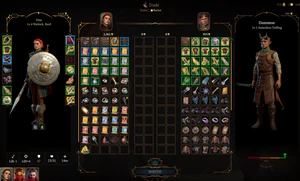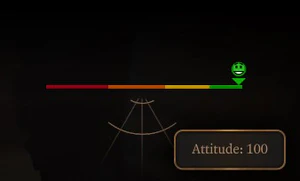Ad placeholder
Trading and item pricing

Trading is a central gameplay mechanic in Baldur's Gate 3 revolving around the sale and barter of Items and Gold. Depending on which Character is talking to a given Trader, including the trader's Attitude to the character, the character's Persuasion value, and the Difficulty setting of the game, a trade price multiplier is calculated. This multiplier is then applied to each item's inherent value, giving the prices for the character.
The price modifier is calculated as:
- P = max(1.0, 2.5 - persuasion modifier - difficulty modifier - attitude modifier)
An item's value is multiplied by the price modifier when buying, and divided by the modifier when selling, i.e. the smaller the total price modifier the better for the trading character.
Modifiers[edit section | visual editor]
Persuasion modifier[edit section | visual editor]
A character's Persuasion value affects prices. Positive values will make prices more favourable (higher when selling, lower when buying) and vice-versa. On Explorer difficulty, characters have a higher Persuasion value if they are proficient in Persuasion because the proficiency bonus is higher on that difficulty. Each Persuasion value point changes the total modifier by 0.1., as detailed below.
- Persuasion modifier = Persuasion value × 0.1
Game difficulty[edit section | visual editor]
Depending on the game difficulty set, the character receives certain advantages or disadvantages.
Explorer difficulty[edit section | visual editor]
On Explorer difficulty, the difficulty modifier is 0.5.
If a character is proficient in Persuasion, they benefit from the higher Proficiency bonus this difficulty provides, depending on their character level, as detailed in the table below. This, in turn, increases the Persuasion modifier.
| Character level | Bonus (explorer difficulty) |
|---|---|
| 1 – 4 | +4 |
| 5 – 8 | +5 |
| 9 – 12 | +6 |
Tactician difficulty[edit section | visual editor]
In Tactician difficulty, the difficulty modifier is −0.5, meaning the total modifier is increased, making it more expensive to buy and lowering the sell price.
Trader attitude[edit section | visual editor]

A trader's Attitude score represents how friendly a trader NPC is with a certain character. Each point of Attitude changes the total modifier by 0.005, resulting in a maximum attitude modifier of 0.5 at 100 Attitude.
- Attitude modifier = Attitude × 0.005
Attitude is visible in the Trading interface under the trader model. Hovering on the meter displays the exact Attitude score. Attitude is per-character, and can be modified by friendly or hostile actions against the NPC (or those nearby). One of easiest ways to gain Attitude is by gifting Gold or other items to a trader using the Barter interface. The amount of gold required to gain attitude scales depending on the level of the character.
| Level | Gold required to raise Attitude by 1 | Gold required to raise Attitude from 0 to 100 |
|---|---|---|
| 1 | 4 | 400 |
| 2 | 5 | 500 |
| 3 | 6 | 600 |
| 4 | 8 | 800 |
| 5 | 10 | 1000 |
| 6 | 14 | 1400 |
| 7 | 18 | 1800 |
| 8 | 24 | 2400 |
| 9 | 30 | 3000 |
| 10 | 36 | 3600 |
| 11 | 45 | 4500 |
| 12 | 45 | 4500 |
When is it optimal to gift?[edit section | visual editor]
Assuming one is only looking to buy once from a trader, calculate the cutoff above which gifting saves more than the value gifted.
- price reduced per gift value = base value / level modifier × 0.005 > 1
If this value is above 1, every gold gifted is worth more in discounts, so the character saves more by raising attitude to 100.
- base value > 200 × level modifier
For example, at level 4, this cutoff is 200 × 8 = 1600. If intending to buy more than 1600 total base value of items, one actually spends less total gold by gifting 800 gold to raise the trader's attitude to 100 first. Note that this refers to base value of items, not the price one sees at 0 attitude, which is usually more than 2 times the base value (see price modifier at the top of the article).
Another possibility is to respec the character in question with Withers. Then, while still at level 1, visit the relevant merchant and gift them 400 gold. The spend cutoff is then 200 x 4 + 100 x 2 = 1000. The 100 x 2 is because 100 attitude reduces prices by half of base price.
A more detailed breakdown of pricing considerations with discussion on their utility can be found on reddit.
Talking character[edit section | visual editor]
The trade price modifier used is based solely on the character who initiates dialogue with the trader. Even if the active character is switched in the trader screen, the first character's trade price modifier remains in use. Therefore, it is a good idea (if not somewhat tedious) to initiate all trade dialogues with the character who has the best trade multiplier.
For example: one could keep a Hireling in camp for this specific purpose and have them join the active party roster only for trading. Without respeccing, the best choices are Brinna Brightsong and Jacelyn for their high Charisma and proficiency in Persuasion. Leaving them at level 1 minimises the cost of getting 100 approval from a trader (400 gold). Conversely, Brinna can get Expertise in Persuasion at Level 3, increase her Charisma at Level 4, and get a higher proficiency bonus at level 5, where 100 approval costs 1000 gold. In light of these facts, one must weigh the various opportunity costs and results.
If the trading party member is disguised when attitude changes happen, those changes only affect that specific disguise - not the character as a whole. Specifically, if the talking character is disguised while attitude is changed, the changes only apply while in the form of that particular disguise, and are not reflected in the character's normal form after the disguise is dismissed. To realize the changes, the same disguise must be reapplied. For example, if disguised as a Femme Dragonborn while donating gold to raise attitude, dismissing the disguise (or applying another disguise) and talking to the trader again with the same character will not not show the improved attitude, but that of the undisguised form. Re-acquiring the disguised form of the Femme Dragonborn will once again provide access to the attitude as adjusted while disguised. Put another way, the game engine keeps a separate attitude score for every aspect (or disguised form) that a character assumes with any merchant, anywhere (forever) - unless changed again in that disguised form.
See also[edit section | visual editor]
References[edit section | visual editor]
- GaRy van Thos Gaming, "How Merchant and Traders Attitude work and effect Prices in Baldur's Gate 3". youtube.com
- Annie Shi, "Baldur’s Gate 3: How To Raise Merchant Attitude". thegamer.com
- desirecampbell, I've decoded merchant pricing reddit.com





































































































































